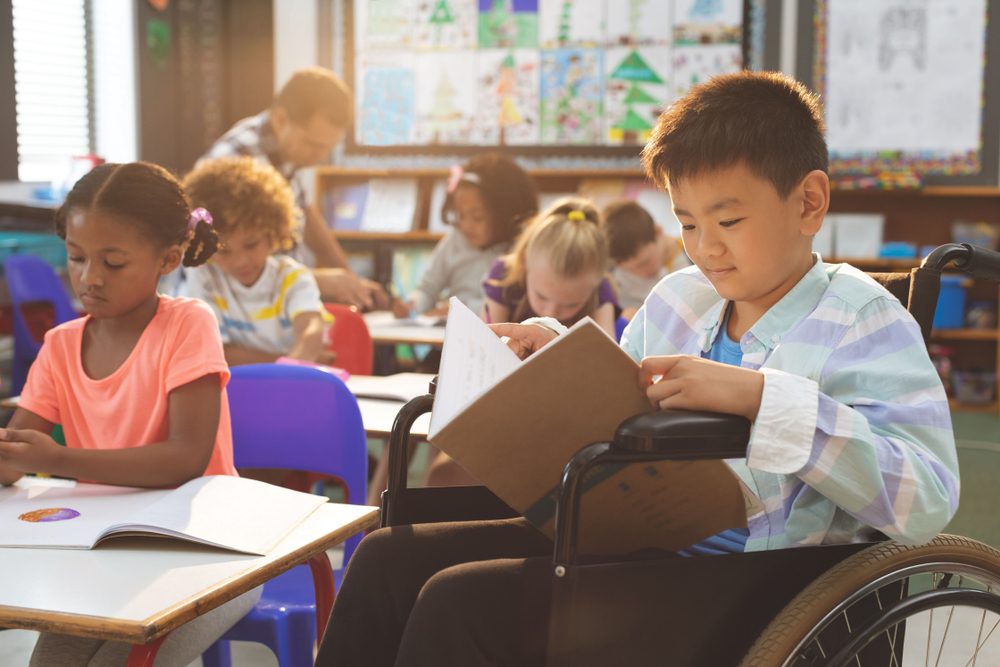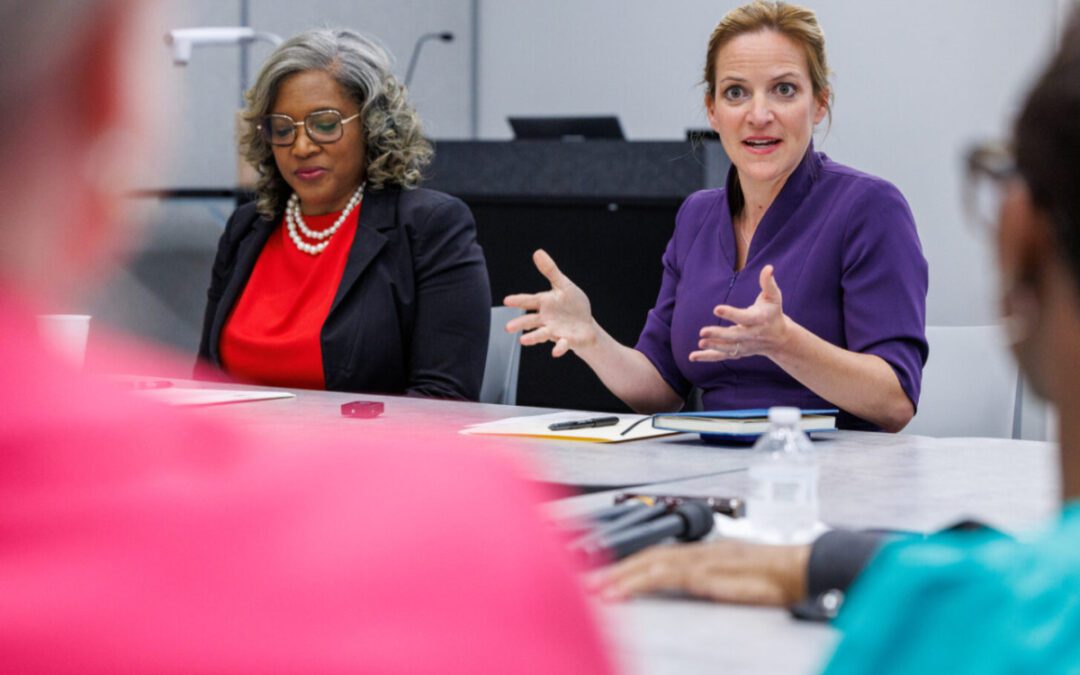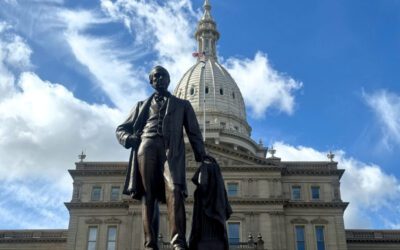
State Sens. Dayna Polehanki and Darrin Camilleri, and state Reps. Regina Weiss and Matt Koleszar are former teachers who serve in leadership roles in the Michigan Legislature.
What happens when voters elect former teachers to take charge of state government? In Michigan, it has translated to record-breaking investments in students and public schools.
MICHIGAN—More than 1.4 million students are enrolled in public schools across Michigan.
And the quality of their education relies heavily on a budget that must be approved every year by politicians. Despite overseeing policy and spending for thousands of schools, Michigan’s halls of power aren’t usually filled with former teachers with practical classroom experience.
In 2018, state Sen. Dayna Polehanki (D-Livonia) was reportedly the only K-12 educator serving on the state Senate Education Committee—the most critical legislative body in Michigan for determining statewide education policy and spending. Before then, it had been at least a decade since a former teacher served on the committee, she told Chalkbeat Detroit.
The tide turned this year.
Record-breaking turnout in last year’s election led to Democrats taking charge of both chambers of the Legislature for the first time in decades, with nearly a dozen ex-teachers serving in the legislature this year. Polehanki was put in charge of the Senate Education Committee, and three other former educators took the reins of three other legislative committees that each carry broad authority over what Michigan kids learn, how they are taught, and how their schools are funded.
How did it pan out?
Here’s a breakdown of nine headlines you may have missed over the last year:
1.) School funding is at an all-time high.
The latest state budget was far different from business as usual in Lansing.
This year, Michigan lawmakers approved a $24 billion budget that centered largely on investments in public education, marking the first opportunity in decades that Democrats have had to craft a spending plan that reflects their legislative priorities for the state’s schools.
Michigan’s public schools receive their state funding, in part, based on the number of students in their classrooms. This year’s budget boosted that funding to its highest point in state history: $9,608 per student. That’s an extra $458 (or 5%) per student compared to last year’s budget.
All told, per-pupil funding has climbed 22% since Gov. Gretchen Whitmer took office in 2019.
2.) Students are making up for lost time.
It’s no secret: The pandemic took a toll on Michigan’s students. Reports show that educational performance in the state has fallen steadily over the past decade—including in key areas like reading and math. But the latest state budget included hundreds of millions of dollars to help.
The annual budget featured a $205 million increase in funding for academically at-risk and economically disadvantaged students, bringing that funding to an all-time-high of $952 million.
Another $150 million was allocated for personal tutoring and additional academic support through the MI Kids Back on Track program, which Whitmer said will help Michigan schools in doubling down on helping students who have fallen behind on their coursework in recent years.
The budget also includes $26 million to expand existing payments for literacy grants and coaches statewide, as well as another $25 million to support new math intervention programs.
3.) Students aren’t going hungry.
It’s hard to learn on an empty stomach. This year, Michigan lawmakers recognized that with a budget that included $160 million to provide all 1.4 million Michigan students with free breakfast and lunch. It’s a move estimated to save the average Michigan family over $850 every year.
Statistics show that more than 70 million free school breakfasts were served to Michigan students in 2022. Expanding the state assistance program to include all students—regardless of their income—was designed to address the strain on families caused by rising food prices.
For parents who usually prepare breakfast in the morning, it also saves time.
Research also shows kids who eat breakfast before school are more likely to do better in reading and math, score higher on assessments, have increased memory and concentration, and maintain a healthier weight, according to a statement from Whitmer’s office.
4.) Free preschool offerings are expanding.
This year’s budget included $255 million to hire teachers and create free preschool offerings for more 4-year-olds in Michigan—a plan first unveiled by Whitmer in January that will help “parents, especially moms, go back to work,” she said.
State officials estimate that up to 5,600 children will gain access to free preschool next year, saving families about $10,000 annually.
5.) Michigan stopped an ‘arbitrary and punitive’ grading practice.
In March, Whitmer signed a bill to repeal a controversial state law which for years has punished Michigan students who fall behind more than one grade level in reading and writing by forcing them to repeat the third grade. Public education advocates have said the requirements did more harm than good, and lawmakers have characterized the old law as “arbitrary and punitive.”
Research from Michigan State University’s Education Policy Innovation Collaborative showed that Black and low-income students were disproportionately impacted by the third-grade retention rules that were enacted by Michigan’s Republican state lawmakers in 2016.
Although Michigan students who fall behind in reading will no longer be forced to repeat third grade, state law still requires schools to offer additional assistance and resources to help them.
6.) Struggling school districts got some much-needed support.
A supplemental budget bill signed into law by Whitmer this month will forgive tens of millions of dollars in debt for five public school districts across Michigan—and ultimately allow those districts to spend more cash on educating students in their local communities.
All told, about $114 million from Michigan’s School Aid Fund is set to go toward forgiving outstanding debts for schools in Benton Harbor, Inkster, Muskegon Heights, Pontiac, and Ypsilanti. State officials said alleviating debt for the districts will boost student learning by enabling districts to afford new textbooks, increase teacher salaries, and reduce class sizes.
The spending bill specifically targeted districts that have been affected by financial emergencies, dissolution, or consolidation—like Ypsilanti Community Schools, which reportedly inherited millions of dollars in debt following a merger with the former Willow Run School District in 2013.
“For a decade, this old debt has been soaking up resources that should be going to support [Ypsilanti Community Schools] students and staff,” Sen. Jeff Irwin (D-Ann Arbor) said in a statement. “It has been a barrier to offering competitive salaries to attract and retain staff, and it has limited the district’s ability to create enhanced learning opportunities for students.”
7.) New laws focus on growth—not test scores.
Democratic-led legislation that Whitmer signed into law last month is designed to provide Michigan students with more personalized, face-to-face learning with teachers instead of burying kids in lessons that are designed almost exclusively for standardized testing.
In Michigan, teachers are evaluated on a regular basis to determine their overall performance in the classroom. Under a framework that has been in place since 2011, student scores on standardized tests have served as the primary metric for determining each teacher’s rating.
The new laws drastically reduced the importance of test scores when evaluating teachers, ensuring no more than 20% (instead of 40%) of their overall evaluations are based on tests.
Democratic lawmakers have said the overhaul will more fairly and effectively measure teacher performance, and lead to more constructive evaluations—namely by ensuring that educators stay focused on individual student needs instead of teaching lessons based entirely on testing.
“We all want our students and teachers to be their best. Years of data show us that an over-burdensome, over-regulated educator evaluation process isn’t delivering that,” co-sponsoring state Sen. Kristen McDonald Rivet (D-Bay City), said in a statement.
8.) Safety is still first—especially when it comes to drinking water.
Whitmer signed a law in October that will require all Michigan schools (and child care centers) to install water filters on faucets, as well as conduct routine testing for lead contamination in their drinking water—making Michigan the first state in the nation to impose such a requirement.
Studies have shown that Michigan has some of the highest rates in the US for its percentage of children who have elevated lead levels in their blood, which is known to cause brain damage.
“We must take steps to protect Michiganders from harmful contaminants—especially our kids,“ State Rep. Cynthia Neeley (D-Flint) said in a statement. “Lead poisoning can have devastating effects on the health and development of our kids. Having a drinking water management plan ensures the most up-to-date strategies and tools are in place to ensure safe water sources.”
9.) Michigan is giving students more stuff to do after school, too.
Research shows that more than 751,000 children in Michigan currently lack access to before- and after-school programs. It’s a trend that bears out nationally and has only gotten worse in the last decade, particularly for kids living in Black and low-income communities.
But by providing millions of dollars in state funding to help address the problem this year, Whitmer and Democratic state lawmakers hope to reverse the trend by giving more Michigan students something productive to do—both before and after class, and over the summer.
This month, Whitmer joined officials with the newly formed state Department of Lifelong, Education, Advancement, and Potential to announce $50 million in state grants to boost access to extracurricular programs for more than 67,000 students at 780 locations across Michigan.
The stated goal: “Ensuring every student gets the support they need to succeed.”
READ MORE: 8 ways Michigan Democrats protected abortion rights in 2023
For the latest Michigan news, follow The ‘Gander on Twitter.
Follow Political Correspondent Kyle Kaminski here.
Support Our Cause
Thank you for taking the time to read our work. Before you go, we hope you'll consider supporting our values-driven journalism, which has always strived to make clear what's really at stake for Michiganders and our future.
Since day one, our goal here at The 'Gander has always been to empower people across the state with fact-based news and information. We believe that when people are armed with knowledge about what's happening in their local, state, and federal governments—including who is working on their behalf and who is actively trying to block efforts aimed at improving the daily lives of Michigan families—they will be inspired to become civically engaged.


Teachers and school staff are on the chopping block in Cheboygan County thanks to the Trump administration
Up in the rural community of Wolverine, superintendent Matt Baughman is worried about how to keep his schools afloat if the Trump administration...

Michigan literacy center begins layoffs amid Trump education funding freeze
A surprise move by the Trump administration to freeze $7 billion in congressionally-approved federal education funding has triggered layoffs and...

Michiganders grill Trump after administration freezes $157 million in federal education funding
As school programs are being reviewed to ensure they align with President Donald Trump’s priorities, Michiganders and education advocates from...

Benson says school funding needs to be decoupled from property wealth
BY ANDREW ROTH, MICHIGAN ADVANCE MICHIGAN—Secretary of State Jocelyn Benson, who is running for governor as a Democrat, is previewing her plan to...

A Detroit student was arrested by ICE. Students at his school are scared and angry.
BY: HANNAH DELLINGER, CHALKBEAT DETROIT Students at Western International High School in Detroit say they are fearful and angry after immigration...





